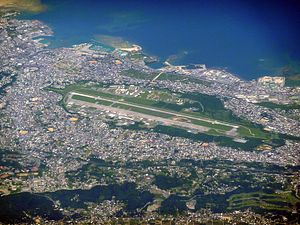Sunday’s mayoral election in Ginowan, Okinawa Prefecture will reverberate far beyond the local level, impacting national politics and even the U.S.-Japan alliance. The incumbent, Atsushi Sakima, defeated rookie challenger, Keiichiro Shimura, for a second four-year term – and clinched Tokyo’s victory in what Kyodo News called a “proxy battle between the central and prefectural governments.” At stake is the Futenma relocation plan, which would move the U.S. Marine Corps Air Station from crowded Ginowan to the Henoko area of Nago. The relocation is important for the maintenance of the U.S.-Japan alliance, but fiercely opposed by Okinawans because of the unfair burden that the U.S. bases place on the prefecture, especially relative to the rest of Japan.
Starting with Susumu Inamine’s victory in the January 2014 Nago mayoral election and Takeshi Onaga’s victory in the November 2014 Okinawa gubernatorial election, candidates backed by the ruling bloc and central government have suffered a series of defeats at the local level at the hands of politicians running in opposition to the Henoko relocation plan. Okinawans are not opposed to the idea of moving the Futenma air base from Ginowan per se – after all, the base’s close proximity to a residential center is a dangerous nuisance for the locals – but they want the base to be relocated outside of Okinawa all together.
Tokyo welcomed Sakima’s win, of course, and central government officials hope that this will reverse some of the recent political setbacks in the prefecture. This victory is also considered key to building momentum for the Futenma base relocation. Prime Minister Shinzo Abe characterized Sakima’s victory as “significant.”
The importance the central government attached to this election was made evident by Chief Cabinet Secretary Yoshihide Suga’s degree of personal involvement. His efforts to support Sakima included talks with U.S. Ambassador Caroline Kennedy last December to accelerate the return of lands to Japan and discussions with executives of Oriental Land Co. for cooperation in fulfilling one of Sakima’s key campaign pledges – hosting a Disney Resort facility on the returned lands. Sakima’s campaign was also backed by visits to the prefecture by popular lawmakers and senior party officials from both the Liberal Democratic Party (LDP) and their coalition party, the Komeito. Even Abe himself paid a call to a member of the Okinawa prefectural assembly, though the most public figures in the Abe government sought to work their influence behind-the-scenes.
Governor Onaga was personally involved in the campaign on Shimura’s side because he, too, had a lot riding on the election. A Shimura victory in Ginowan would have helped maintain the anti-relocation movement’s momentum. Because of this loss, with Sakima winning 27,668 votes to Shimura’s 21,811, pro-relocation elements can criticize Onaga’s stubbornness, saying the residents of Ginowan want the relocation to take place.
The LDP hopes that this will help turn the tide in their favor in the Okinawa prefectural assembly elections and national Upper House elections this summer. As LDP Election Strategy Committee Chairman Toshimitsu Motegi commented: “The victory in the Ginowan mayoral election, which was the run-up to the upper house election, was quite significant.”
However, it is unclear how accurate this reading of local sentiment might be. After all, Sakima never clarified his position on relocating the U.S. base to Henoko specifically. Sakima called for the “closing and removal of the base as soon as possible,” but did not provide a vision for what would happen to the U.S. base thereafter. Given that, it is hard to argue that Ginowan residents were voting for moving the bases to Henoko; they were, rather, voting against keeping the bases in Ginowan. There was also much maneuvering to underplay ties between Sakima and Abe – clearly, Sakima’s victory is not a ringing Okinawan endorsement of Abe’s security agenda.
Furthermore, in an exit poll conducted by Asahi Shimbun, 57 percent of 1,263 respondents said they oppose the Henoko plan while only 34 percent back it. Of the 57 percent who oppose the Henoko plan, 76 percent voted for anti-relocation Shimura – suggesting that Sakima won not because voters support the Futenma relocation plan, but because not enough voters cared enough about to vote solely based on that issue.
Indeed, 48 percent of responders answered that Futenma was an issue they considered when voting, while 19 percent looked to the candidates’ past achievements and another 19 percent saw economic and welfare issues as important issues. Perhaps Sakima’s record as a mayor and the voters’ belief that Sakima’s economic and social policies would be better (or that Sakima’s willingness to cooperate with the LDP would bring greater economic and social benefits to Ginowan) was the decisive factor. It is too soon to conclude, as LDP officials have, that Ginowans do not share the same antipathy to the Henoko plan that most Okinawans do. Abe’s obvious determination to proceed with the relocation regardless of the outcome of the elections may also have disincentivized voters from casting a vote for Shimura.
For now, even though Onaga continues to pursue his goals through legal means, the relocation is set to move full-steam ahead. On Monday morning, Defense Minister Gen Nakatani affirmed that construction work will continue in Henoko, though he also paid lip service to reducing the Okinawan’s burden of hosting U.S. bases.

































